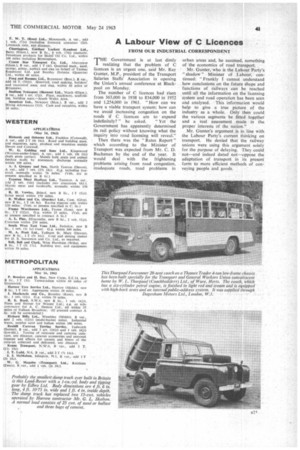A Labour View of C Licences
Page 43

If you've noticed an error in this article please click here to report it so we can fix it.
FROM OUR INDUSTRIAL CORRESPONDENT Government is at last dimly "['HE that the problem of C licences is an urgent one, said Mr. Ray Gunter, M.P., president of the Transport Salaries Staffs' Association in opening the Union's annual conference at Blackpool on Monday.
The number of C licences had risen from 365,000 in 1938 to 834,000 in 1952 and 1,254,000 in 1961. "How can we have a viable transport system; how can we avoid increasing congestion on the roads if C licences are to expand indefinitely?" he asked. "Yet the Government has apparently determined its rail policy without knowing what the inquiry into road licensing will reveal."
Then there was the "Rates Report" which according to the Minister of Transport was expected from Mr. C. D. Buchanan by the end of the year. It would deal with the frightening problems arising from road congestion, inadequate roads, road problems in urban areas and, he assumed, something of the economics of road transport.
Mr. Gunter, who is the Labour Party's "shadow" Minister of Labour, continued: "Frankly I cannot understand how conclusions on the future shape and functions of railways can be reached until all the information on the licensing system and road operation has been seen and analysed. This information would help to give a true picture of the industry as a whole. Only then could the various segments be fitted together and a real assessment made in the proper interests of the nation."
Mr. Gunter's argument is in line with the Labour Party's current thinking on transport. He denied that the railway unions were using this argument solely for the purpose of delaying. They could not—and indeed dared not—oppose the adaptation of transport in its present form to more efficient methods of conveying people and goods.
















































































































